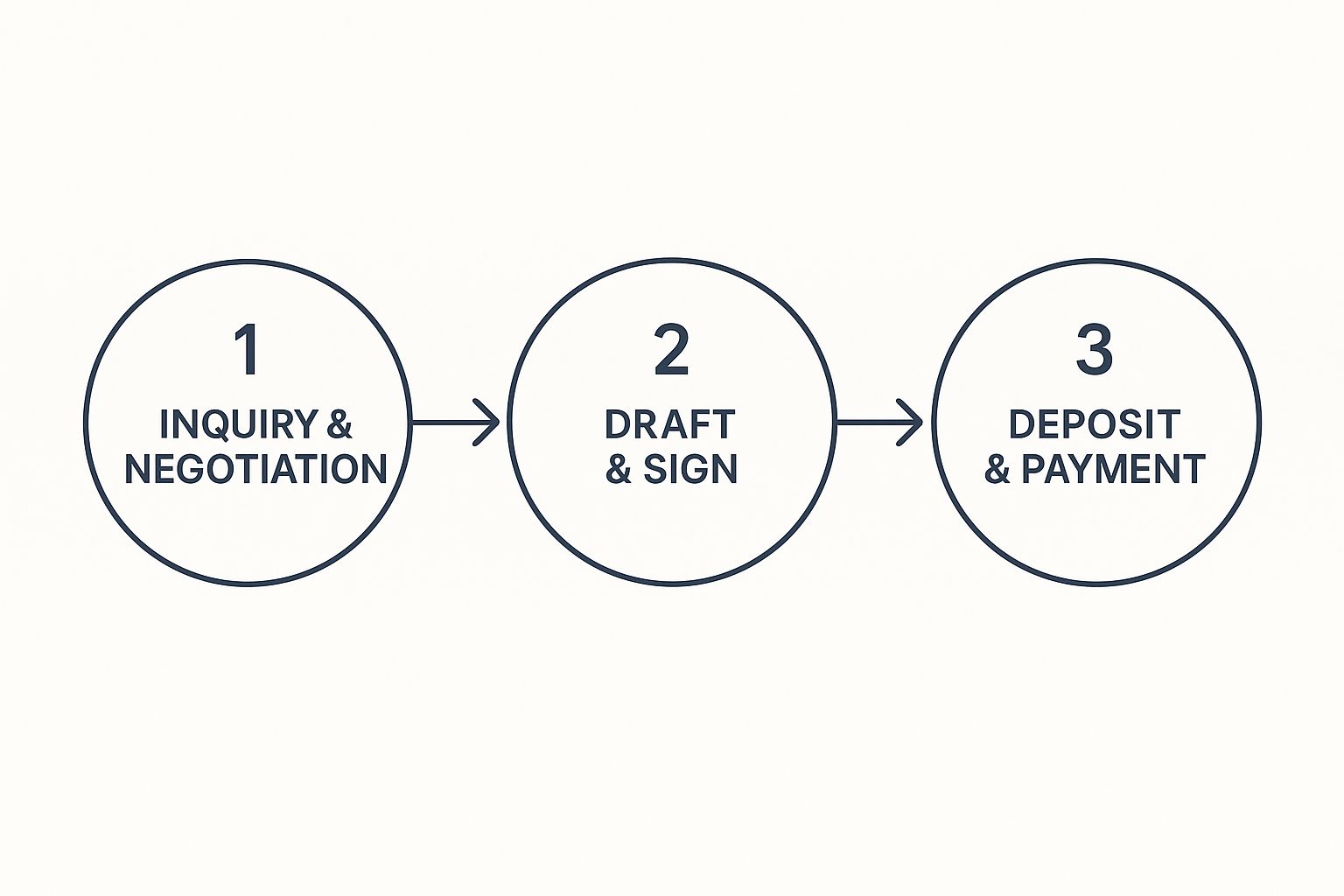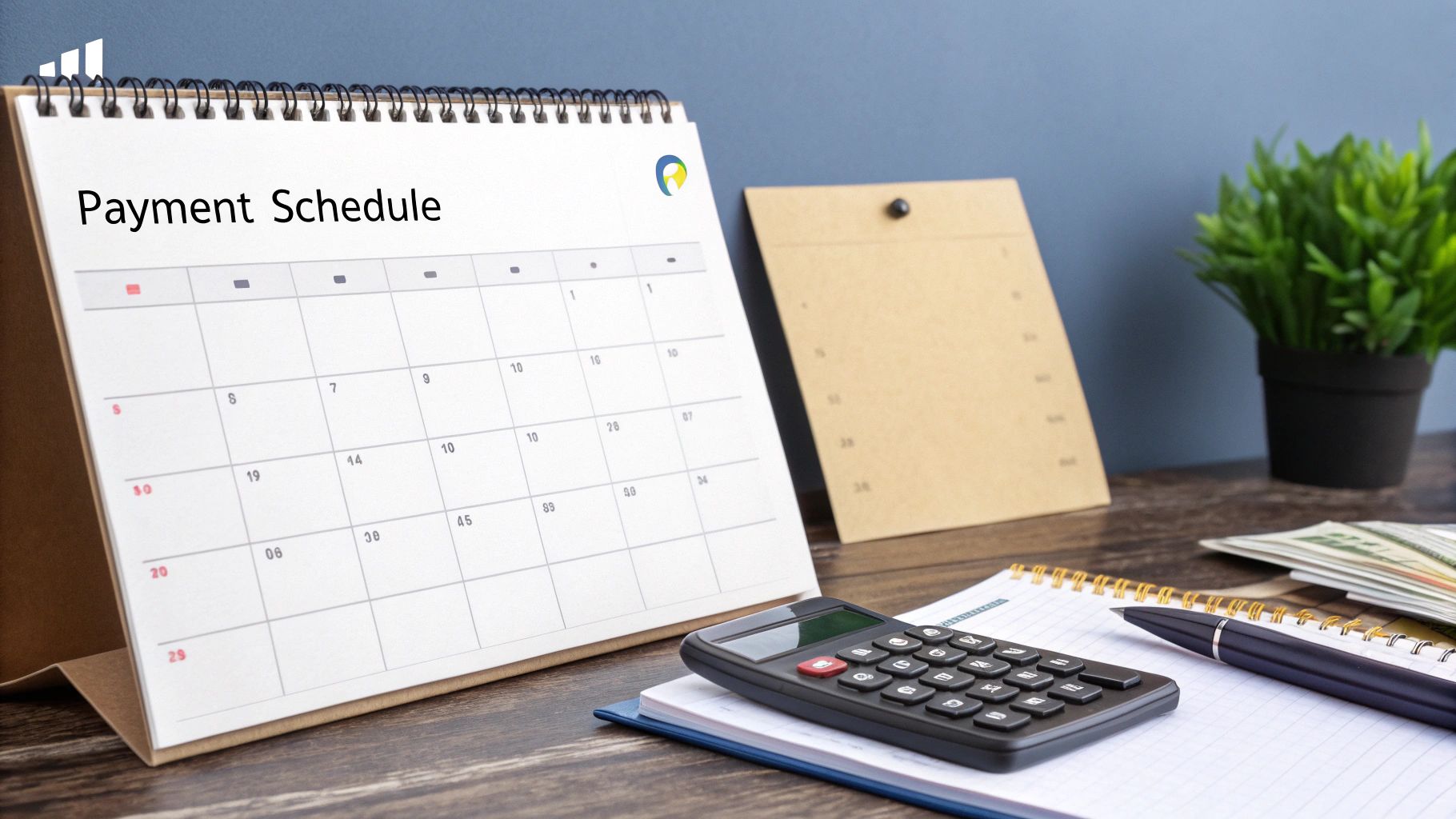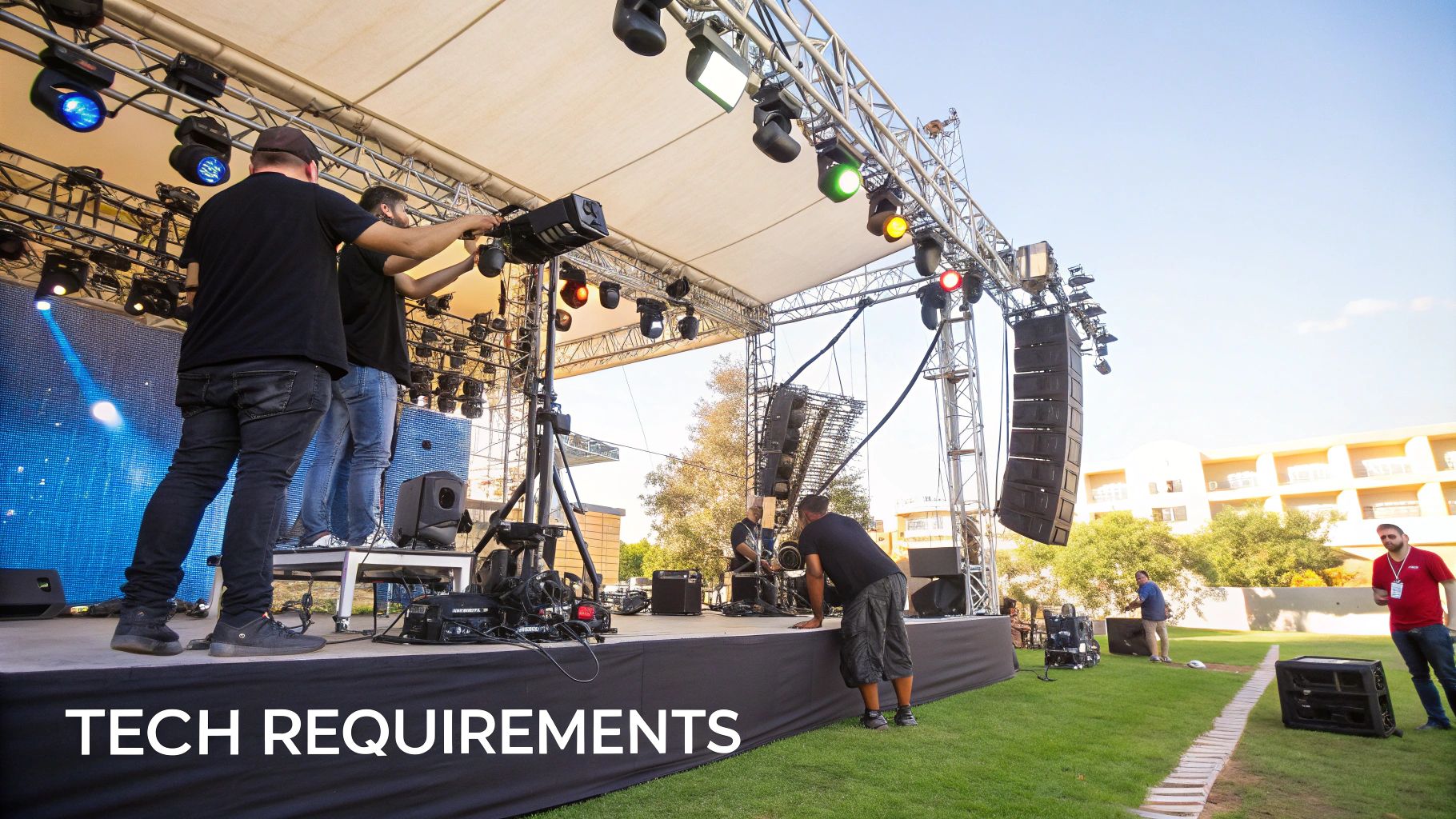An artist booking contract isn't just a piece of paper; it's the professional spine of every single performance you play. It's the document that makes sure everyone, from the artist to the promoter to the venue owner, is on the same page and protected. This is where you turn handshake deals and enthusiastic emails into a clear, legally-binding playbook that covers every last detail鈥攆rom how you get paid to what kind of microphone you need.
Why Your Next Gig Needs a Bulletproof Contract
Long before you hit the first note, the most important part of the performance happens on paper. I see it all the time, especially with artists just starting out鈥攖hey rely on verbal agreements or a quick email chain. It feels easier in the moment, I get it. But it leaves a massive gray area for miscommunication, arguments, and professional trainwrecks that can ruin a relationship or cost you a ton of money.
Having a solid contract isn't about being difficult or showing distrust. It's about being a professional. It鈥檚 about clarity. It鈥檚 a tool that aligns your expectations perfectly with the promoter's, which ultimately makes for a better show for everyone involved.
Moving Beyond Handshake Deals
Let me paint you a picture. A band gets booked for a summer festival based on a few hyped-up phone calls. The promoter promises them a killer time slot, a full backline, and a flat $2,000 fee. Sounds great, right?
But when they show up, reality hits. Their set has been bumped to a tiny side stage at 2 PM. The sound guy is missing half the gear they need. And worst of all, the promoter is now saying the fee was dependent on ticket sales鈥攚hich, of course, were terrible.
Without a signed contract, that band is stuck. It's just their word against the promoter's. This exact scenario plays out way more often than you'd think, and a simple artist booking agreement would have prevented the whole mess.
Your contract is your first line of defense. It turns assumptions into agreements and protects your art, your time, and your income. It's the professional foundation every successful gig is built on.
The True Purpose of a Booking Contract
Think of your contract as a collaborative guide, not a weapon. It's a document that builds a bridge between you and the event organizer, ensuring you both get what you need for a successful show. A well-drafted agreement really boils down to a few key goals:
- Sets Crystal-Clear Expectations: It nails down performance times, set lengths, and who is responsible for what. No more guessing games.
- Guarantees Your Paycheck: It locks in your fee, the payment schedule, and any ticket splits. This takes all the awkwardness and ambiguity out of getting paid.
- Defines Your Technical Needs: This is where you list the specific sound, lighting, and stage gear you need to perform. It helps you avoid showing up to a technical nightmare.
- Protects You From the Unexpected: It should always include clauses for cancellations, unforeseen events (force majeure), and liability, giving you a safety net when things inevitably go wrong.
Breaking Down Your Booking Contract Clause by Clause
Diving into a contract can feel like you're trying to read a different language. I get it. But every single clause is in there for a reason鈥攖o protect both you and the promoter.
Think of your artist booking contract not as a scary wall of text, but as a set of building blocks. Each one defines a specific piece of the deal, and understanding them is the only way to build a solid foundation for a successful gig.
Let's start with the absolute basics. The very first section has to clearly name everyone involved. This means full legal names and business names for you (or your LLC) and the promoter or venue. Don't just slap your stage name on there; get the official details down on paper to avoid any confusion later about who is legally on the hook.
This part of the contract also sets the stage for the whole agreement, nailing down the core details of the performance.
- Date and Time: Get hyper-specific here. I'm talking performance date, venue arrival time, soundcheck time, and the exact start and end time for your set.
- Performance Length: Pin this down in minutes (e.g., "a sixty (60) minute performance"). This is what stops a promoter from trying to get you to play an extra half hour "for the fans" without paying you for it.
- Venue Details: List the full, official name and address of the venue. No shortcuts.
The Riders: Technical and Hospitality Needs
Your riders are technically attachments to the main contract, but make no mistake, they are just as legally binding and absolutely critical. This is where you detail everything you need to put on a professional show. A vague rider is just asking for a disaster.
The technical rider covers everything stage-related: sound, lights, backline. It should list out specific microphones, monitors, DI boxes, stage dimensions, and any power requirements you have. The hospitality rider is where you outline things like a secure dressing room, meals, and drinks for you and your crew. Just keep it reasonable and scaled to the size of the gig.
The entire booking process, from that first email to the final payment, tends to follow a predictable flow. This infographic breaks down the three main stages you'll go through.

Seeing the journey laid out like this makes it a lot less intimidating. It shows how the back-and-forth negotiation leads to a signed deal, which then kicks off the financial side of things.
And this whole process is moving online. The global live music booking platform market was valued at around $1.3 billion in 2024 and is projected to hit $3.2 billion by 2033. This massive growth shows a clear shift toward platform-based negotiations, which makes having a rock-solid contract template more important than ever.
Unpacking the "What If" Clauses
Some of the most important parts of your contract are the ones you hope you never have to use. These clauses are your safety net when things inevitably go wrong.
A force majeure clause, for example, deals with unforeseeable events that make the show impossible鈥攖hink natural disasters, government shutdowns, that sort of thing. It usually lets either party postpone or cancel without taking a financial hit.
The cancellation clause is just as vital. It needs to spell out exactly what happens if the promoter pulls the plug. A strong clause will have a sliding scale of fees they owe you, based on how close to the show date they cancel.
Pro Tip: Your cancellation clause should be your shield against last-minute changes. A common setup is for the promoter to owe 50% of your guarantee if they cancel within 30 days and 100% if they cancel within 14 days of the show date.
To help you get comfortable with the legalese, it's worth spending some time . The clearer these terms are from the start, the smoother your professional relationships will be. For more specific examples, you can also check out our guide on /blog/2025/music-industry-contract-templates.
Before we move on, here's a quick cheat sheet for some of the most important clauses you'll encounter.
Key Contract Clauses Explained
This table is a quick-reference guide to the heavy hitters in any artist booking contract and what they actually mean for you.
| Clause Name | What It Covers | Key Customization Tip |
|---|---|---|
| Parties to the Agreement | Identifies the full legal names of the artist/entity and the promoter/venue. | Use your legal name or business entity (e.g., "Your Band LLC"), not just your stage name. |
| Performance Details | The specific date, time, duration, and location of the performance. | Be precise with times鈥攊nclude load-in, soundcheck, set start, and set end to avoid ambiguity. |
| Compensation | The artist's fee (guarantee), deposit amount, payment schedule, and method of payment. | Always require a 50% deposit upon signing to confirm the date and secure your booking. |
| Cancellation | The terms and financial penalties if either the artist or the promoter cancels the show. | Implement a sliding scale penalty for promoter cancellations (e.g., 100% of the fee if canceled within 14 days). |
| Force Majeure | "Act of God" clause; covers unforeseeable events that prevent the show from happening. | Ensure it allows for rescheduling as a first option before outright cancellation. |
| Technical & Hospitality Rider | The artist's specific technical (sound, lights) and hospitality (food, lodging) needs. | Attach the riders as official exhibits to the contract to make them legally binding. |
| Merchandising | Rights to sell merchandise at the venue and the percentage (if any) paid to the venue. | Negotiate for a lower "hall fee" or, ideally, 100% of merch sales to the artist. |
Getting a handle on these clauses isn't just about legal protection; it's about being a prepared professional who knows their business. The more you know, the more control you have over your career.
Alright, let's talk about the most important part of any contract: getting paid. The financial section is the beating heart of your artist booking agreement, turning vague promises into actual money in your bank account. This isn't just about a number; it's about making sure your payment is secure and predictable.

This is where you spell out the deal in plain terms. It has to be crystal clear, fair to you, and leave zero room for creative interpretations down the line.
Choosing Your Payment Structure
How you get paid can look different depending on the show, how big of a crowd you draw, and the promoter's style. Each deal structure comes with its own set of risks and potential rewards.
- Flat Guarantee: This is your safest bet. You and the promoter agree on a set fee, and that's what you get paid, period. It doesn't matter if five people or five hundred show up. It's predictable, secure, and what most artists should aim for.
- Percentage of the Door: Here, you're gambling on your ability to fill the room. You get a cut of the ticket sales. It's high-risk, high-reward. A slow night means a small paycheck, but a sold-out show could mean a massive payday.
- Hybrid Model (Guarantee vs. Percentage): This is often the sweet spot. You get a smaller guaranteed fee to cover your basics, plus a percentage of ticket sales after the promoter covers their costs. It gives you a safety net while still letting you share in the success of a great night.
These aren't just abstract ideas; they're tied to real market trends. In 2024, the global recorded music market hit around $29.6 billion in revenue, and live shows are a massive piece of that pie. For example, Europe, which accounts for 29.5% of global music revenues, saw market growth between 4.1% and 7.5%, directly impacting how promoters structure these deals. Knowing the market helps you negotiate smarter.
Structuring the Payment Schedule
When you get paid is just as critical as how much. Let me be clear: never, ever agree to receive 100% of your fee after the performance. A professional payment schedule protects you from flaky promoters and last-minute nonsense.
Here鈥檚 the industry standard you should insist on:
- 50% Deposit Upon Signing: This is non-negotiable. The deposit confirms the booking and takes your date off the market. If a promoter balks at paying a deposit, that鈥檚 a huge red flag. Seriously, walk away.
- 50% Final Balance on the Day of the Show: The rest of the money should be in your hand before you hit the stage. Specify how you want it鈥攃ertified check, wire transfer, or even cash.
A signed contract without a paid deposit is just a piece of paper. The transfer of funds is what makes the agreement real and secures your commitment.
Don't Forget Merchandise Sales
Your merch is a huge part of your income on the road, so your contract needs to protect it. The merchandise clause outlines your right to sell your stuff at the venue. More importantly, it addresses the hall fee鈥攖hat's the cut the venue takes from your merch sales.
You need to negotiate this, always. Start by asking for a 0% hall fee. You might not get it, but it's the right place to start. A more realistic rate is usually 10-20%. Get specific on whether that percentage is based on gross (total) sales or net sales (after your costs). If you want to see how to word these kinds of specifics, take a look at our guide on essential contract clause examples.
Crafting Your Technical and Hospitality Riders
Let's talk about riders. If the main contract is the "what" and "when" of the gig, your riders are the "how." These documents are where the show really starts to take shape, moving beyond dates and fees into the nitty-gritty of your actual performance.
A lot of artists, especially early on, are hesitant to put a rider together. They worry it looks demanding. But a well-crafted rider isn't a list of demands鈥攊t's a legally binding instruction manual that gives the venue a precise blueprint for your performance. It鈥檚 the difference between a smooth, professional show and a night of technical nightmares and logistical chaos.

Honestly, venue staff want to give you what you need. Their job is to put on a great show, too. But they aren't mind readers. Clear, reasonable, and detailed riders make their job infinitely easier and ensure you can walk on stage ready to kill it.
Detailing Your Technical Needs
Your technical rider is your on-stage survival guide. It has to be specific enough that any professional sound engineer can glance at it and know exactly what to provide. Trust me, vague requests like "a good sound system" are a recipe for disaster. You'll show up to find two mismatched speakers on sticks and a mixer from 1992.
You need to get granular. Here's what's non-negotiable:
- Stage Plot: This is a literal map. A simple visual diagram showing where each band member stands and where their gear goes. It eliminates guesswork during setup.
- Input List: Create a channel-by-channel list detailing every single microphone and direct input (DI) you need. Be specific with preferences, like "Shure SM58 for lead vocals" or "DI for acoustic guitar."
- Backline Gear: List any specific amplifiers, drum kits, or keyboards the venue is responsible for providing. Just as important: if you're bringing your own gear, state that clearly to avoid any confusion or duplication.
- Power and Lighting: Don't forget the basics. Specify your power requirements and any simple lighting needs that are essential to your show's vibe.
A detailed tech rider isn't you being difficult; it's you being a professional. It shows respect for the venue's crew and sets a standard of excellence before you even load in. It's the single best tool you have for preventing on-stage technical problems.
A great way to organize all this info before putting it into a formal rider is by using . They help you structure your thoughts into a clear, actionable format that promoters and tech crews will genuinely appreciate.
Building a Practical Hospitality Rider
Ah, the hospitality rider. This is the one that gets a bad rap, conjuring images of rockstars demanding bowls of only brown M&Ms. In reality, its purpose is much more practical: ensuring you and your crew are taken care of so you can deliver an amazing performance.
A good hospitality rider focuses on necessities, not over-the-top luxuries. The goal is to create a professional and comfortable environment backstage so you can focus on the show.
Key elements to include:
- Dressing Room: This is your home base for the night. Specify the need for a clean, private, and secure space with decent lighting and enough power outlets for everyone.
- Food and Beverages: Be reasonable. Requesting a hot, decent meal for your team and plenty of bottled water is standard practice. If anyone has allergies or dietary restrictions, list them clearly.
- Guest List: Define your guest list policy upfront. State the number of complimentary tickets you require for press, friends, or family.
- Security: If you have specific concerns about the security of your gear or personnel, this is the place to address them.
Remember, your riders should be tailored to the gig. A rider for a 150-cap club show will look very different from one for a major festival. Keep it scalable, keep it professional, and keep it focused on what you truly need for a successful performance.
How to Spot Contract Red Flags and Common Pitfalls
Signing a bad deal can be far worse than having no deal at all. I've seen it happen. An artist gets excited about an offer, rushes to sign, and completely misses the fine print that jeopardizes their career down the road. Learning to spot the subtle traps and common pitfalls in a booking contract is one of the most valuable skills you can develop.
A major red flag is any kind of ambiguous language, especially around key responsibilities. I'm talking about phrases like "promoter will provide reasonable marketing support." What does "reasonable" even mean? It's meaningless without specifics. Your contract should spell out the exact deliverables: the number of social media posts, inclusion on email newsletters, or specific ad placements. Get it in writing.
Vague Clauses and Hidden Risks
Another classic pitfall is an overly broad exclusivity clause. It鈥檚 pretty standard for a promoter to ask that you don鈥檛 play another show in the same city within a certain timeframe. No big deal.
However, you need to watch out for clauses that restrict you from performing within a massive radius鈥攕ay, 100 miles鈥攆or an extended period, like 90 days before and after the show. A clause like that can easily lock you out of lucrative opportunities in neighboring markets.
Cancellation terms are also a minefield. If the promoter鈥檚 cancellation clause is vague or lets them back out with a minimal penalty, you鈥檙e left completely exposed. A solid contract clearly defines the financial consequences for the promoter if they cancel, protecting your income and schedule. This is a point you have to negotiate with confidence. You can learn more about what makes agreements solid in our guide on the essentials of contracts for entertainment.
Understanding Liability and Indemnity
Finally, pay close attention to liability and indemnity clauses. These clauses decide who is financially on the hook if something goes wrong鈥攍ike an audience member getting injured or venue equipment getting damaged. An unfair contract might try to make you liable for incidents that are completely out of your control. You need to ensure these clauses are mutual and fair, assigning responsibility in a way that actually makes sense.
A contract that heavily favors one party is a sign of an unbalanced professional relationship. Your goal should always be a fair, clear, and mutually beneficial agreement that protects everyone involved.
The global music market is getting more complex. Valued at around $33.32 billion in 2025, it鈥檚 only projected to grow. North America, which accounts for about 34.5% of this market, has sophisticated legal systems that have led to incredibly intricate contracts, especially around content ownership and performance cancellations. You can find more insights about . Staying aware of these trends helps you spot terms that are outdated or just plain predatory.
Your Booking Contract Questions Answered

Navigating the world of booking agreements can bring up a lot of questions. Even with a solid artist booking contract template, unique situations are bound to pop up. Let鈥檚 clear the air on some of the most common queries I see from artists, giving you the confidence to handle them like a pro.
One of the biggest anxieties is last-minute changes. What happens if a promoter suddenly wants to cancel the show? This is exactly why your cancellation clause is non-negotiable.
A well-written contract will specify a clear timeline for cancellations and the financial consequences that follow. For instance, if the promoter cancels within 30 days of the show, they might still owe you 50% of your guarantee. If they pull out within seven days, that should jump to 100%.
This clause isn't about punishment. It's about protecting you from lost income and the very real problem of not being able to book another gig on that date.
Legal and Financial Clarifications
In our fast-paced industry, things move quickly. This often leads to questions about digital processes and how the money works.
A common one: are digital signatures legally binding on a booking contract? Absolutely. In most places, like the U.S. with its ESIGN Act, electronic signatures are just as valid as ink on paper.
Using a trusted service creates a secure audit trail, making it a standard and efficient practice, especially for booking international gigs. Just make sure both parties agree to it in writing.
Another frequent question revolves around payment terms. What鈥檚 the difference between a guarantee and a percentage deal?
- A guarantee is a fixed, flat fee you get paid for the performance, period. It doesn't matter how many tickets are sold. It's your secure income for the night.
- A percentage deal (often called a "door deal") means you receive a percentage of the ticket revenue, usually after the promoter covers their expenses. It's riskier, but can be far more profitable if you pack the house.
Many artists I work with find success with a hybrid model, which offers a lower guarantee plus a percentage of profits. This provides a great balance of security and potential upside.
Do I need a lawyer to review every single booking contract? While it isn't practical for every small gig, investing in an entertainment lawyer to perfect your standard artist booking contract template is a game-changer. For major deals, festivals, or agreements with unusual clauses, seeking legal advice is always the smartest move to protect your career.
Navigating the complexities of entertainment law requires a partner who understands your creative journey. At Cordero Law, we specialize in providing strategic counsel to artists and entrepreneurs. Let's build a secure foundation for your career together.
